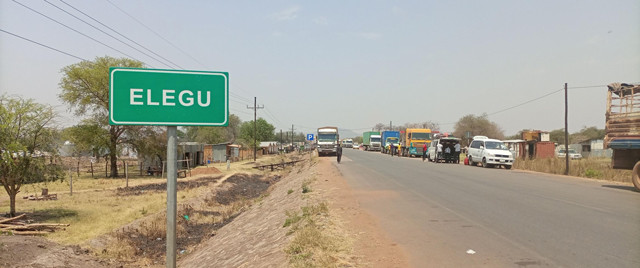Residents in the Nimule town council in Eastern Equatoria State have raised an alarm over looming starvation in the area due to the continuous entry restrictions by Ugandan authorities at the border due to Covid-19.
Speaking to Radio Tamazuj on Sunday, several Nimule residents said they used to go to Uganda’s border town of Elegu to purchase essential commodities, especially food items, but have begun to experience difficulties as Ugandan authorities continue to restrict entry.
Gale Joyce said life in Nimule has become difficult since they no longer have access to the Ugandan side to purchase commodities.
“Life is very difficult, even the few available items are now very expensive because things are brought from Uganda and they are highly taxed before reaching the market,” Gale explained. “So, now life is getting harder and even money is scarce in people’s hands. Before the border was closed, life was a bit good, if one has some small Uganda shillings you just cross and buy what you want”.
Another Nimule resident, Henry Inyani, decried the restrictions into Uganda people experience nowadays and said the situation has also created delays in the movement of cargo from Kampala.
“People normally go and buy food items but for you to reach Nimule you need to pay the security agents and so on. We have been affected in the sense that getting access to the route becomes a problem. At the end of the day, getting goods as soon as possible becomes a problem and it requires a lot of money,” Inyani said.
The chairperson of the Nimule chamber of commerce, Michael Abuni, acknowledged the suffering of the town’s people and advised the government to remove taxes on food items and drugs until the situation improves.
“To the government should remove taxes from consumable goods but still they are overcharging, even the local government are still taxing. Instead, they tripled the taxes for traders this year as compared to previous years. There is a rate for local government and that for customs, including the transport services, meaning the cost of business now is becoming very high,” Abuni said.
Max Yousif Khalafala, the Nimule town clerk, confirmed the scarcity of food but attributes it to the prevalence of Coronavirus in Uganda. He also blames traders for skipping Nimule when transiting goods and urges them to be fair by delivering goods to the locals in the area before proceeding to Juba.
“This issue of lockdown (in Uganda) is affecting Nimule seriously because many things come from Elegu town (Uganda) and nothing is produced here in Nimule. There is a situation going on recently where all the goods just proceed to Juba and do not stop here, but we have been discussing this issue because these are all communities of South Sudan,” Khalafala said.
For his part, the chairperson for the Civil Society Network in Eastern Equatoria State, Charles Okullu Cyprian, says the two neighboring countries (South Sudan and Uganda) should build common relations and make internal arrangements to allow local people cross the border to have access to goods while observing Covid-19 preventive measures.
“Our view is that what is taking place at the Nimule border now is alarming. What is important is that these two countries should have a good relationship. The question to ask is if Uganda and South Sudan have a good relationship, because now we are in a crisis and people are dying because of sickness and because there is no food, businesses are also not doing well,” Okullu said.
He added, “These countries should sit down and discuss internally for our people to move freely to bring goods. We are not saying they should violate Covid-19 protocols, the governments of South Sudan and Uganda should make internal arrangements to allow people to cross while putting Covid-19 protocols in place.”




